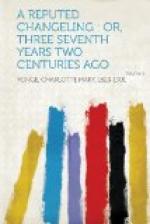There was an evident sensation, and glances were cast at the upright, military figure, standing like a sentinel, as if the audience expected him to murder them all.
As before, the examination began with Robert Oakshott’s identification of the clothes and sword, but Mr. Cowper avoided the subject of the skeleton, and went on to inquire about the terms on which the two young men had lived.
“Well,” said Robert, “they quarrelled, but in a neighbourly sort of way.”
“What do you call a neighbourly way?”
“My poor brother used to be baited for being so queer. But then we were as bad to him as the rest,” said Robert candidly.
“That is, when you were boys?”
“Yes.”
“And after his return from his travels?”
“It was the same then. He was too fine a gentleman for any one’s taste.”
“You speak generally. Was there any especial animosity?”
“My brother bought a horse that Archfield was after.”
“Was there any dispute over it?”
“Not that I know of.”
“Can you give an instance of displeasure manifested by the prisoner at the deceased?”
“I have seen him look black when my brother held a gate open for his wife.”
“Then there were gallant attentions towards Mrs. Archfield?”
Charles’s face flushed, and he made a step forward, but Robert gruffly answered: “No more than civility; but he had got Frenchified manners, and liked to tease Archfield.”
“Did they ever come to high words before you?”
“No. They knew better.”
“Thank you, Mr. Oakshott,” said the prisoner, as it was intimated that Mr. Cowper had finished. “You bear witness that only the most innocent civility ever passed between your brother and my poor young wife?”
“Certainly,” responded Robert.
“Nothing that could cause serious resentment, if it excited passing annoyance.”
“Nothing.”
“What were your brother’s political opinions?”
“Well”—with some slow consideration—“he admired the Queen as was, and could not abide the Prince of Orange. My father was always at him for it.”
“Would you think him likely to be an emissary to Holland?”
“No one less likely.”
But Mr. Cowper started up. “Sir, I believe you are the younger brother?”
“Yes.”
“How old were you at the time?”
“Nigh upon nineteen.”
“Oh!” as if that accounted for his ignorance.
The prisoner continued, and asked whether search was made when the deceased was missed.
“Hardly any.”
“Why not?”
“He was never content at home, and we believed he had gone to my uncle in Muscovy.”
“What led you to examine the vault?”
“My wife was disquieted by stories of my brother’s ghost being seen.”
“Did you ever see this ghost?”




